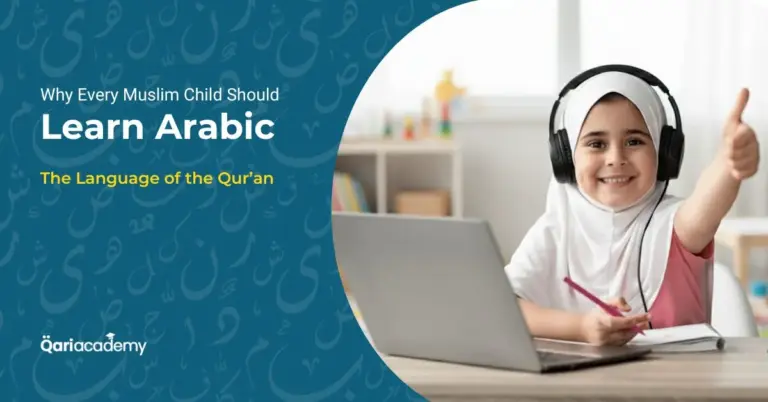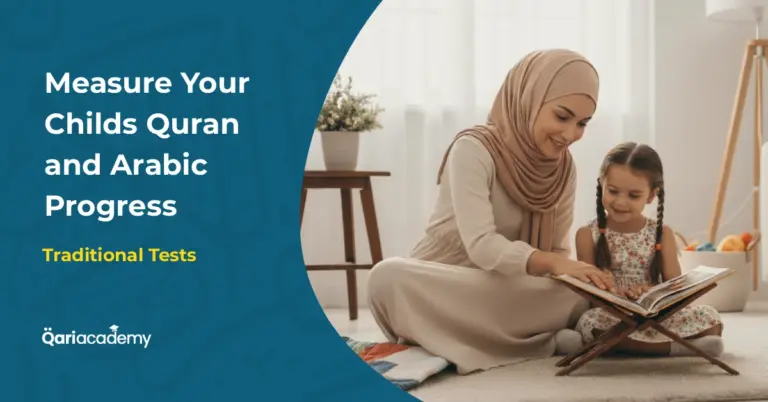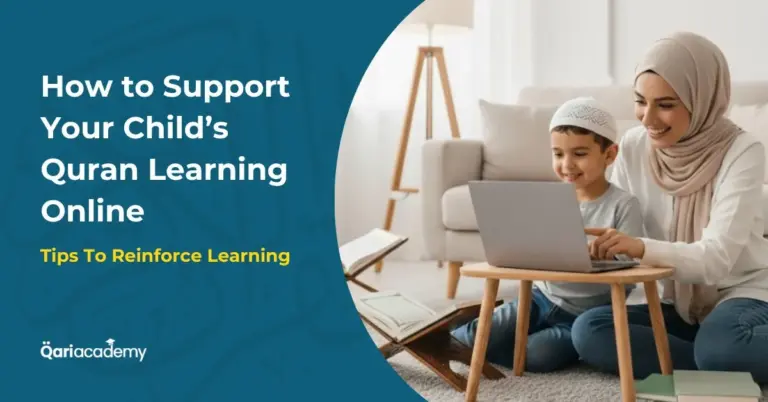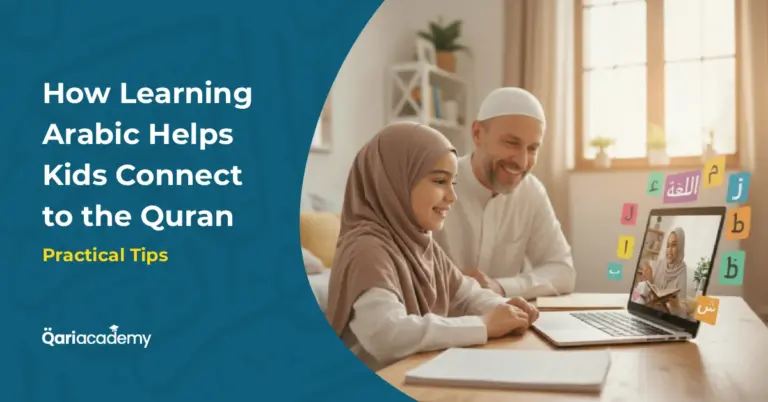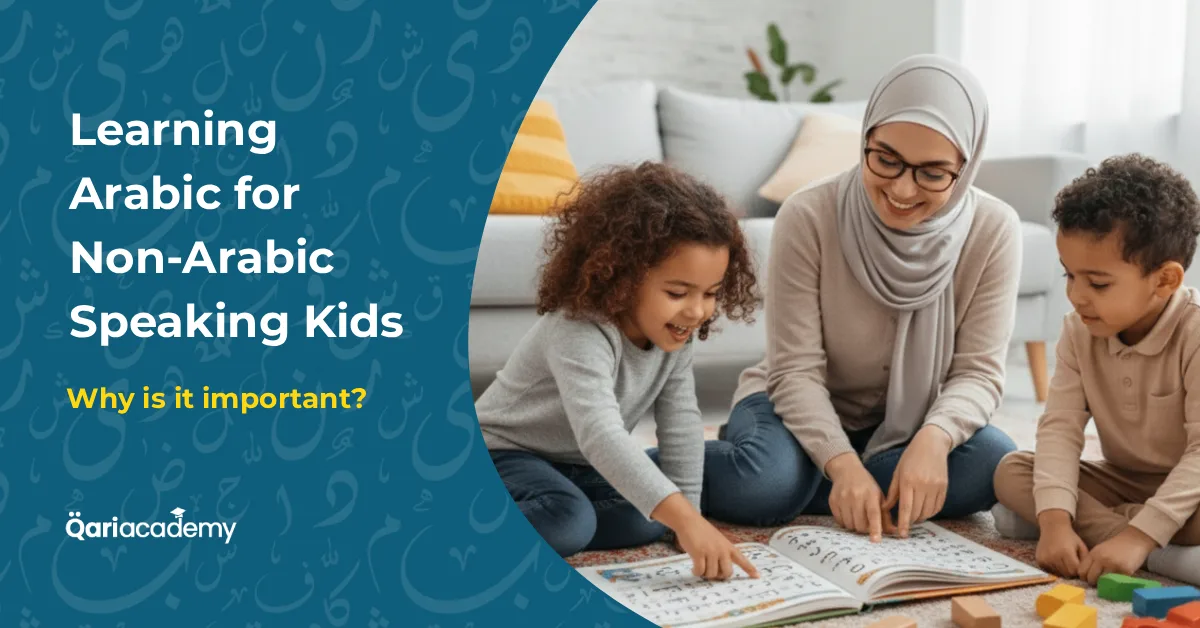
Introduction
Arabic for Non-Arabic Speaking Kids is a crucial step for helping children understand and recite the Quran accurately. Even beginners can make consistent progress with structured guidance, interactive methods, and daily practice. Learning Arabic early strengthens comprehension, improves Tajweed application, and builds confidence during Quran recitation.
At QariAcademy, we specialize in helping Non-Arabic Speaking Kids learn Quranic Arabic through engaging online lessons that balance education and enjoyment. Our one-on-one sessions, interactive tools, and progress tracking ensure that children aged 6–16 develop both language skills and a deep spiritual connection with the Quran.
1. Start with the Basics
- Introduce the Arabic alphabet gradually.
- Use visual aids, flashcards, and interactive apps to reinforce recognition.
- Practice simple words and letters daily to build familiarity and confidence.
- Encourage children to trace letters and write short words to enhance memorization.
2. Focus on Quranic Vocabulary
- Begin with frequently used words in the Quran, such as Rahmah (Mercy) and Sabr (Patience).
- Encourage children to memorize short Surahs while understanding their meanings.
- Repeat words and phrases aloud to improve pronunciation and retention.
- Use flashcards and matching games to make vocabulary learning interactive and enjoyable.
3. Incorporate Listening and Recitation
- Listen to native reciters to grasp proper pronunciation, rhythm, and tone.
- Repeat after tutors or audio recordings to enhance fluency.
- Combine listening with writing exercises to reinforce memorization and understanding.
- Encourage children to recite short verses daily, gradually increasing length.
4. Use Engaging Methods
- Storytelling and educational games make learning fun and memorable.
- Reward milestones with praise, stickers, or small incentives.
- Include interactive quizzes and challenges to test knowledge and reinforce Quran learning.
- Connect lessons to real-life examples to make Quranic teachings meaningful.
5. Practice Consistently
- Short daily sessions (10–15 minutes) are more effective than long, irregular lessons.
- Gradually increase session duration as skills and confidence grow.
- Encourage children to practice both during lessons and at home for better retention.
- Track progress regularly to celebrate achievements and adjust learning plans.
6. Benefits of Learning Arabic Early
- Enhances Quran comprehension and accurate Tajweed application.
- Builds a strong foundation for future Islamic studies.
- Strengthens memory, concentration, and cognitive abilities.
- Helps children feel confident during Salah and recitation.
- Encourages a deeper spiritual connection with the Quran.
- Improves overall language skills and critical thinking for young learners.
7. Why QariAcademy is Ideal
- Tailored beginner-friendly Quran lessons for Non-Arabic Speaking Kids.
- Qualified native tutors provide accurate pronunciation guidance.
- One-on-one online classes ensure personalized attention.
- Flexible schedules accommodate families across the USA, UK, and Canada.
- Fun, interactive methods keep children motivated and engaged.
- Progress tracking and regular reports for parents ensure accountability.
👉 Start your child’s Arabic for Quran journey today. Enroll in a free trial at QariAcademy.com!
FAQ
Q1: Can children learn Arabic without prior knowledge?
A: Yes. QariAcademy’s lessons are designed for Non-Arabic Speaking Kids, gradually building vocabulary, reading skills, and confidence.
Q2: How long does it take to learn Quranic Arabic?
A: Consistency is key; noticeable progress usually appears in 2–4 months with daily practice.
Q3: Are online Arabic classes effective for kids?
A: Absolutely. One-on-one guidance, interactive methods, and audio support make online learning highly effective.
Q4: Should parents assist in Arabic learning?
A: Yes. Encouragement, review, and practicing together enhance learning and retention.
Q5: Can learning Arabic improve Quran memorization?
A: Definitely. Understanding words makes memorization easier and more meaningful for Non-Arabic Speaking Kids.
Q6: Are interactive games useful for learning Arabic?
A: Yes. Gamified lessons and quizzes make learning enjoyable and help reinforce vocabulary, pronunciation, and comprehension.
Q7: How often should children practice Quranic Arabic?
A: Daily practice, even for 10–15 minutes, ensures steady progress and retention.
Q8: How can I make Arabic learning more fun for my child?
A: Use interactive games, storytelling, songs, and quizzes. Reward progress with praise or small incentives. Combining fun activities with regular practice keeps Non-Arabic Speaking Kids motivated and engaged.

